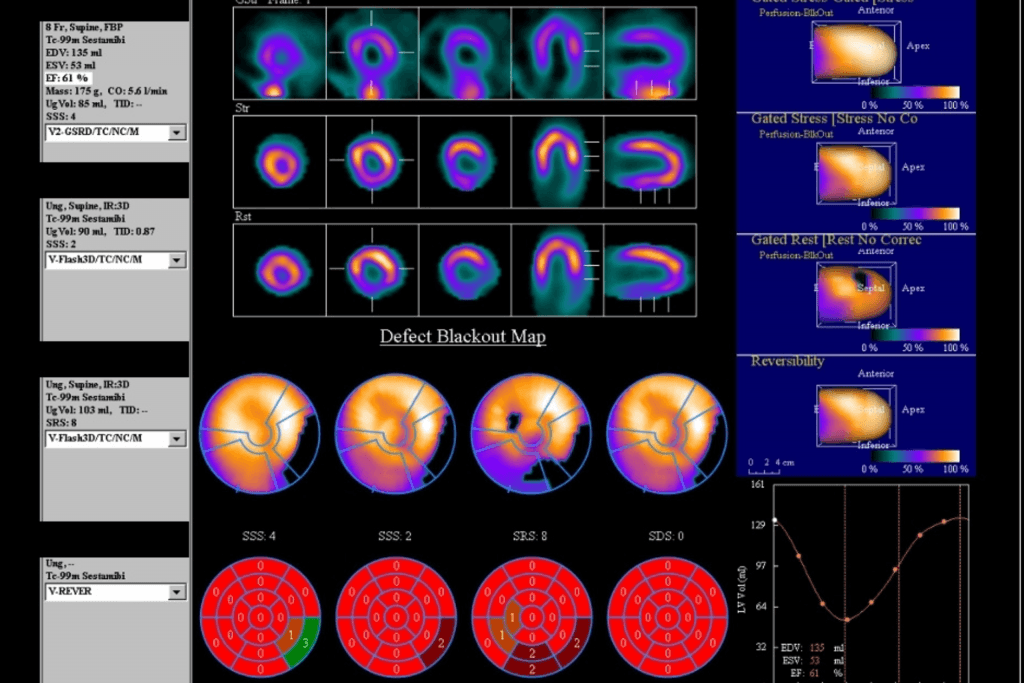Myocardial Perfusion Scan

Myocardial Perfusion Scan in Birmingham
Myocardial perfusion scans, are also known as nuclear stress tests, they are a specialised imaging test which is used to assess the blood flow to your heart muscles both at rest and during physical activity or medication-induced stress. This scan helps doctors evaluate how well your heart is pumping blood and detect any areas of reduced blood flow, which could indicate coronary artery disease or other heart conditions. At OneMedicine, we offer advanced myocardial perfusion scans to help diagnose and monitor heart health with precision.
What is a myocardial perfusion scan?
A myocardial perfusion scan uses a small amount of a radioactive substance (called a tracer) that is injected into your bloodstream. A special camera then captures images of your heart to see how well blood is flowing through the coronary arteries to your heart muscle. The scan is typically performed in two parts—once while you are at rest and again while your heart is under stress, either through exercise or with medication.
This test is particularly helpful for identifying areas of the heart that are not receiving enough blood, which can be a sign of coronary artery disease or heart muscle damage.
When should you consider a myocardial perfusion scan?
You may need a myocardial perfusion scan if:
- You are experiencing symptoms such as chest pain, shortness of breath, or fatigue that suggest a heart problem.
- You have a history of heart disease or have had a heart attack, and your doctor needs to assess the extent of heart muscle damage.
- You need to determine whether coronary artery disease is causing reduced blood flow to your heart muscle.
- Your doctor needs to monitor the effectiveness of previous treatments, such as stent placement or bypass surgery.
This test is essential for understanding how well your heart is functioning and for determining the best treatment approach.
Cost
- Myocardial perfusion scan £ Get in touch
How is a myocardial perfusion scan performed?
A myocardial perfusion scan is a multi-step process, usually carried out over several hours:
- Preparation: You may be asked to avoid eating, drinking, or taking certain medications before the scan. Comfortable clothing and shoes are recommended if you’ll be walking on a treadmill.
- Injection of tracer: A small amount of a radioactive tracer is injected into a vein. This substance travels to your heart and allows the imaging camera to capture detailed pictures of the blood flow.
- Resting images: The first set of images is taken while you are at rest. You’ll lie on a table while a special camera moves around your chest to capture pictures of your heart.
- Stress test: The second part involves increasing your heart rate to assess blood flow under stress. You may walk on a treadmill, or if you’re unable to exercise, a medication will be administered to simulate the effects of exercise on your heart.
- Stress images: After the stress phase, another injection of the tracer is given, and a second set of images is taken to compare with the resting images.
- Completion: The entire process usually takes a few hours, but you can go home once the scan is complete.
Is a myocardial perfusion scan safe?
Yes, a myocardial perfusion scan is generally safe. The amount of radiation exposure from the tracer is minimal and comparable to other imaging tests, such as X-rays. The procedure is non-invasive and painless, although some patients may experience mild side effects from the stress medication, such as flushing or dizziness. These symptoms usually go away quickly.
If you have any allergies or specific health conditions, it’s important to inform your doctor beforehand so they can take the necessary precautions to ensure the procedure is safe for you.
Get seen by Dr Ibrar Ahmed
At OneMedicine, we provide expert myocardial perfusion scan services to help diagnose and monitor heart conditions with accuracy and care. Our experienced team ensures that your test is performed safely, and we provide you with clear and detailed results to guide your heart health treatment plan.






